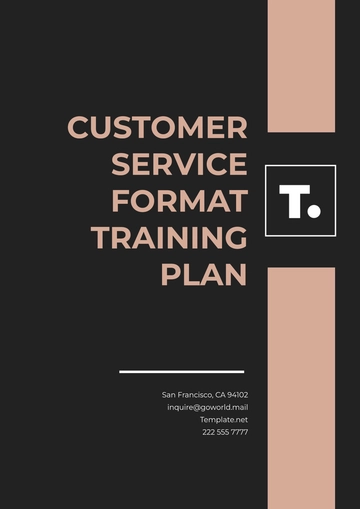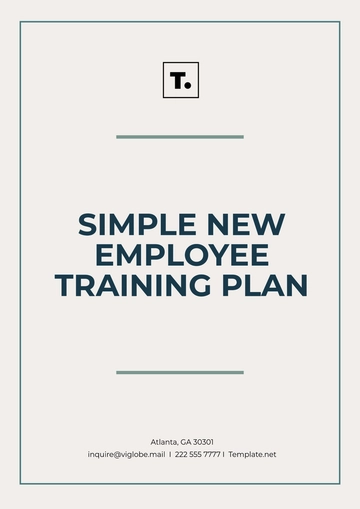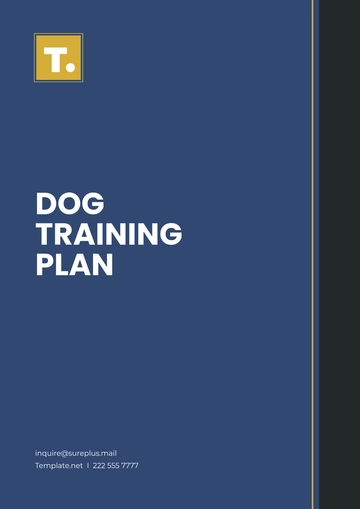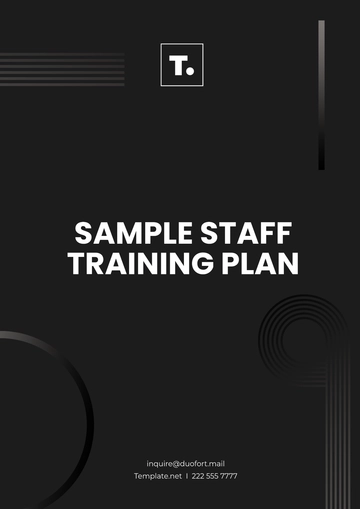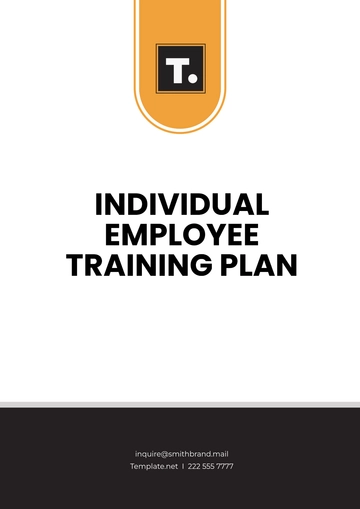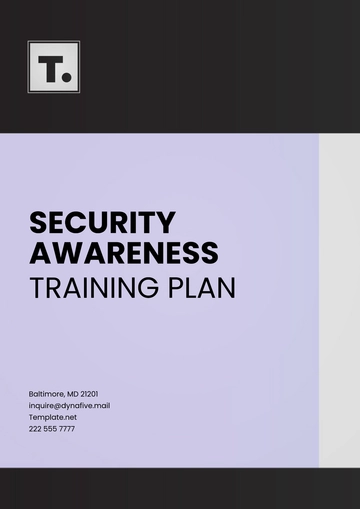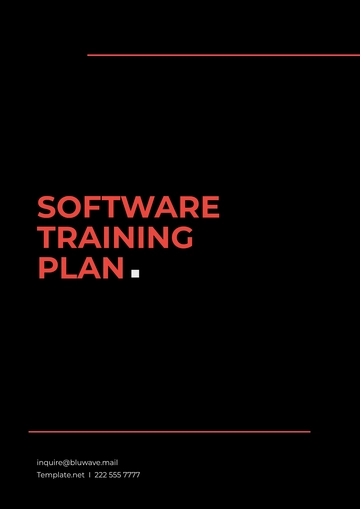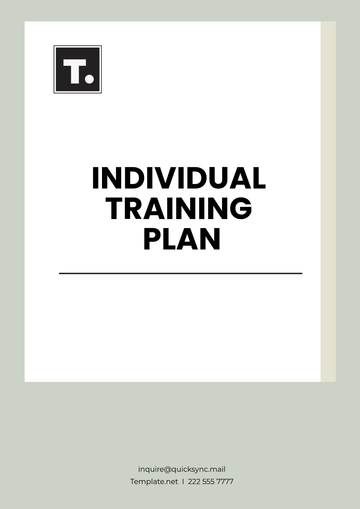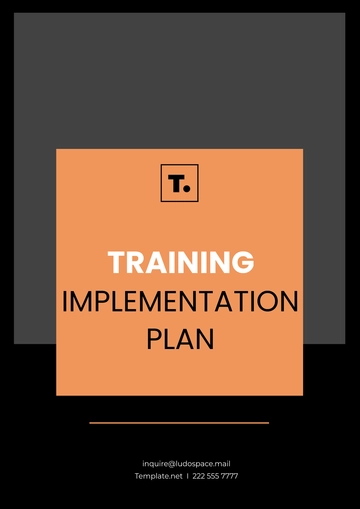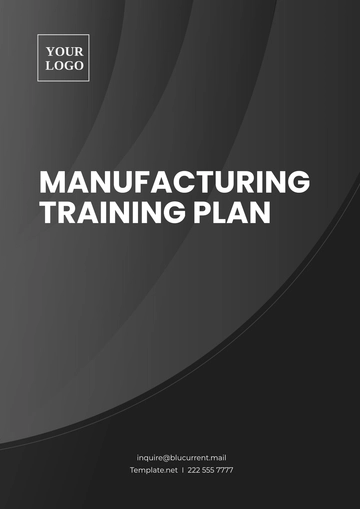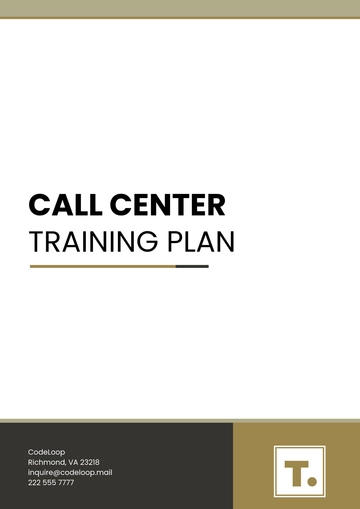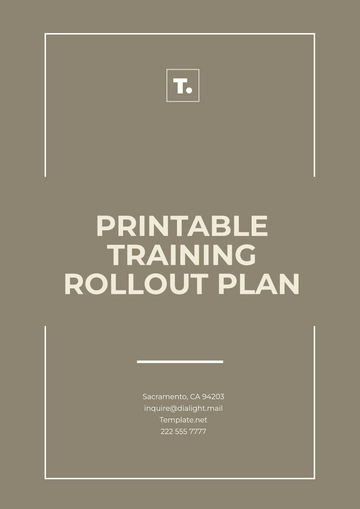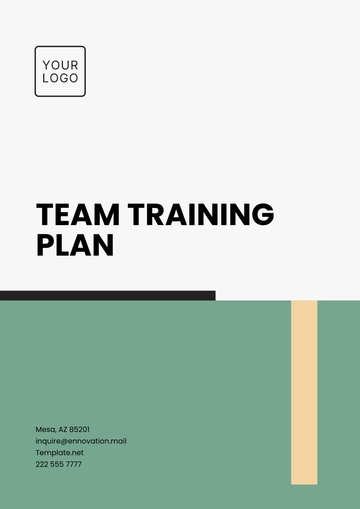Free Laboratory Training Plan
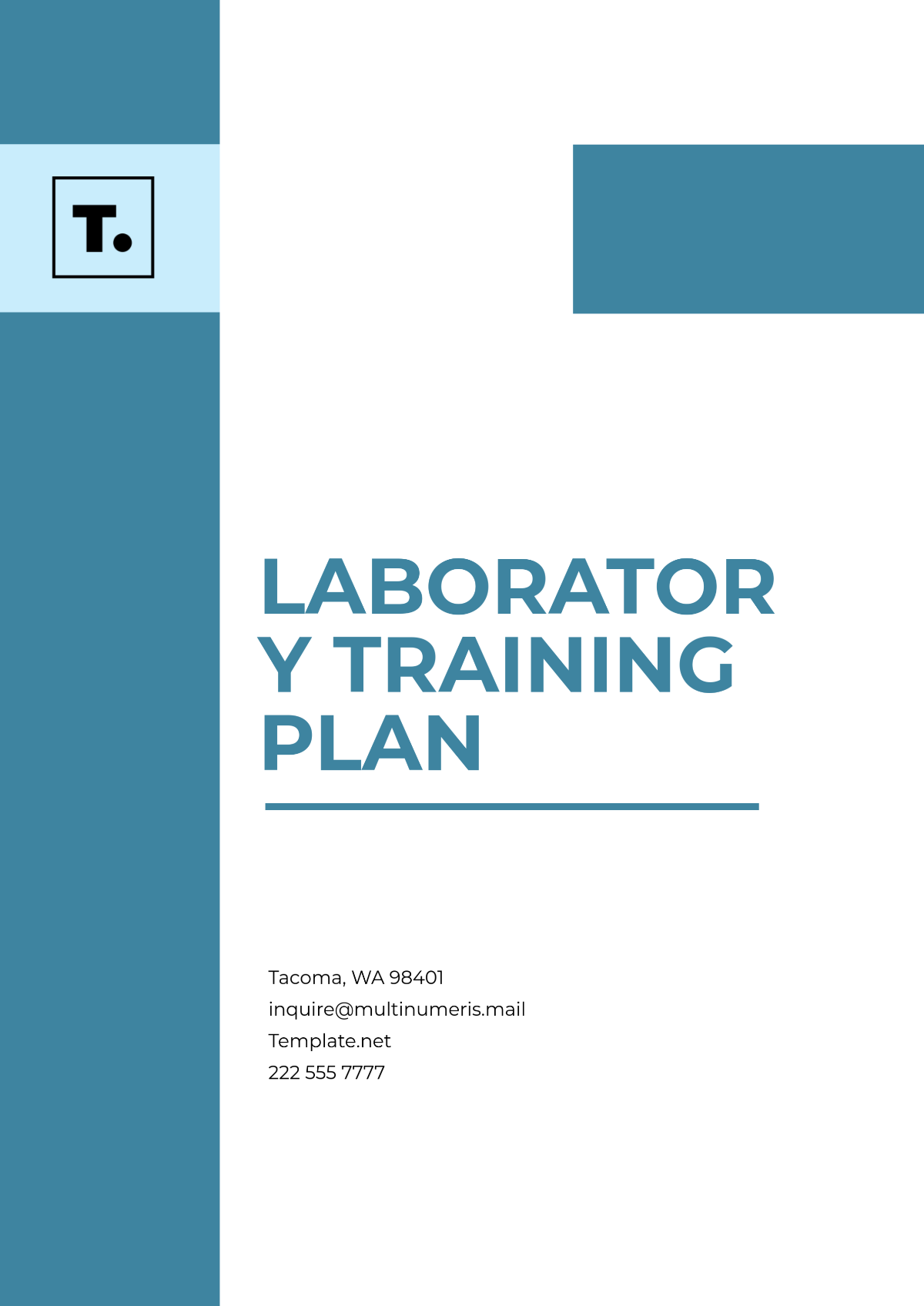
Written by: [Your Name]
I. Introduction
A. Welcome Message
This Laboratory Training Program is designed to provide you with the necessary skills, knowledge, and safety protocols required to work effectively and safely in a laboratory setting. This training plan is essential for ensuring compliance with regulatory standards, maintaining a safe work environment, and promoting best practices in laboratory operations.
B. Training Objectives
Safety Awareness: Educate laboratory personnel on the importance of safety procedures, hazard identification, and emergency protocols to minimize risks and prevent accidents.
Technical Proficiency: Provide comprehensive training on laboratory equipment, techniques, and procedures to ensure accurate and reliable experimental results.
Compliance with Regulations: Ensure adherence to regulatory requirements and industry standards governing laboratory operations, including protocols for handling hazardous materials, waste disposal, and data management.
Professional Development: Foster continuous learning and skill development among laboratory staff to enhance productivity, efficiency, and innovation in scientific research and experimentation.
II. Training Schedule
A. Orientation and Safety Training
Day | Training Module | Description |
|---|---|---|
Day 1 | Laboratory Orientation | Introduction to laboratory facilities, equipment, and personnel; Overview of laboratory safety policies and procedures |
Day 2 | Chemical Safety Training | Hazardous chemical handling, storage, and disposal protocols; Personal protective equipment (PPE) requirements |
Day 3 | Biological Safety Training | Handling of biological materials, including pathogens, genetically modified organisms (GMOs), and biohazards |
Day 4 | Radiation Safety Training | Safe handling and use of radioactive materials; Radiation exposure monitoring and protective measures |
Day 5 | Emergency Response Procedures | Protocols for responding to laboratory accidents, spills, fires, and other emergencies; Evacuation drills |
B. Technical Training
Week | Training Focus | Description |
|---|---|---|
Week 1 | Laboratory Equipment and Instrumentation | Operation and maintenance of common laboratory equipment, such as microscopes, centrifuges, spectrophotometers, and pH meters |
Week 2 | Laboratory Techniques | Hands-on training in basic laboratory techniques, including pipetting, titration, microscopy, and gel electrophoresis |
Week 3 | Data Analysis and Documentation | Data recording, analysis, and interpretation; Laboratory notebook documentation; Quality control procedures |
Week 4 | Advanced Techniques and Specialized Training | Specialized training in advanced laboratory techniques relevant to specific research projects or areas of expertise |
C. Compliance and Quality Assurance
Month | Training Module | Description |
|---|---|---|
Month 1 | Good Laboratory Practices (GLP) | Principles of GLP for ensuring the reliability, integrity, and traceability of laboratory data and results |
Month 2 | Quality Management Systems (QMS) | Introduction to QMS standards, such as ISO 9001 and ISO/IEC 17025; Internal audit procedures |
Month 3 | Regulatory Compliance | Overview of relevant regulations and guidelines governing laboratory operations, including FDA, EPA, OSHA, and CLIA |
Month 4 | Document Control and Records Management | Procedures for document control, version control, and records management; Electronic laboratory notebook (ELN) usage |
III. Resources
A. Reference Materials
Laboratory Safety Manuals: Comprehensive guides outlining laboratory safety policies, procedures, and emergency protocols.
Technical Manuals: Instruction manuals and operating procedures for laboratory equipment and instrumentation.
Regulatory Documents: Copies of relevant regulations, standards, and guidelines governing laboratory operations.
B. Online Training Resources
E-Learning Modules: Interactive online courses covering various aspects of laboratory safety, techniques, compliance, and professional development.
Webinars and Seminars: Virtual training sessions conducted by subject matter experts on specific topics related to laboratory operations and best practices.
C. Expert Support
Safety Officers: Contact information for designated safety officers responsible for overseeing laboratory safety and providing guidance on safety-related issues.
Technical Support: Access to technical experts or consultants for assistance with troubleshooting equipment, techniques, or experimental procedures.
IV. Performance Evaluation
Regular evaluation of laboratory staff performance to ensure competency and compliance with training objectives. Assessment methods include the following:
Skills Proficiency Tests: Practical assessments to evaluate proficiency in laboratory techniques and procedures.
Safety Audits: Regular inspections of laboratory facilities and work practices to identify potential hazards and ensure compliance with safety protocols.
Compliance Audits: Review of documentation and procedures to assess adherence to regulatory requirements and quality standards.
V. Feedback and Continuous Improvement
Encouragement of feedback from laboratory personnel to identify areas for improvement and address any concerns or challenges. Continuous improvement strategies will include:
Feedback Surveys: Solicitation of feedback through anonymous surveys or suggestion boxes to gather input on training effectiveness and areas for enhancement.
Training Program Reviews: Periodic reviews of the training program content, delivery methods, and outcomes to identify opportunities for updates or modifications.
Continuous Training and Development: Provision of ongoing training opportunities and professional development resources to support skill enhancement and career advancement.
VI. Conclusion
In conclusion, this Laboratory Training Plan serves as a crucial foundation for promoting safety, proficiency, and compliance in laboratory operations. By providing comprehensive training in safety protocols, technical skills, and regulatory compliance, we empower laboratory personnel to conduct experiments and research with confidence and competence.
- 100% Customizable, free editor
- Access 1 Million+ Templates, photo’s & graphics
- Download or share as a template
- Click and replace photos, graphics, text, backgrounds
- Resize, crop, AI write & more
- Access advanced editor
Promote safety and proficiency in the lab with the Laboratory Training Plan Template from Template.net. This customizable, downloadable, and printable template is designed for structuring effective laboratory training programs. With its easy-to-use AI Editor Tool, you can tailor every aspect to meet the precise requirements of your laboratory, promoting best practices and compliance.
You may also like
- Finance Plan
- Construction Plan
- Sales Plan
- Development Plan
- Career Plan
- Budget Plan
- HR Plan
- Education Plan
- Transition Plan
- Work Plan
- Training Plan
- Communication Plan
- Operation Plan
- Health And Safety Plan
- Strategy Plan
- Professional Development Plan
- Advertising Plan
- Risk Management Plan
- Restaurant Plan
- School Plan
- Nursing Home Patient Care Plan
- Nursing Care Plan
- Plan Event
- Startup Plan
- Social Media Plan
- Staffing Plan
- Annual Plan
- Content Plan
- Payment Plan
- Implementation Plan
- Hotel Plan
- Workout Plan
- Accounting Plan
- Campaign Plan
- Essay Plan
- 30 60 90 Day Plan
- Research Plan
- Recruitment Plan
- 90 Day Plan
- Quarterly Plan
- Emergency Plan
- 5 Year Plan
- Gym Plan
- Personal Plan
- IT and Software Plan
- Treatment Plan
- Real Estate Plan
- Law Firm Plan
- Healthcare Plan
- Improvement Plan
- Media Plan
- 5 Year Business Plan
- Learning Plan
- Marketing Campaign Plan
- Travel Agency Plan
- Cleaning Services Plan
- Interior Design Plan
- Performance Plan
- PR Plan
- Birth Plan
- Life Plan
- SEO Plan
- Disaster Recovery Plan
- Continuity Plan
- Launch Plan
- Legal Plan
- Behavior Plan
- Performance Improvement Plan
- Salon Plan
- Security Plan
- Security Management Plan
- Employee Development Plan
- Quality Plan
- Service Improvement Plan
- Growth Plan
- Incident Response Plan
- Basketball Plan
- Emergency Action Plan
- Product Launch Plan
- Spa Plan
- Employee Training Plan
- Data Analysis Plan
- Employee Action Plan
- Territory Plan
- Audit Plan
- Classroom Plan
- Activity Plan
- Parenting Plan
- Care Plan
- Project Execution Plan
- Exercise Plan
- Internship Plan
- Software Development Plan
- Continuous Improvement Plan
- Leave Plan
- 90 Day Sales Plan
- Advertising Agency Plan
- Employee Transition Plan
- Smart Action Plan
- Workplace Safety Plan
- Behavior Change Plan
- Contingency Plan
- Continuity of Operations Plan
- Health Plan
- Quality Control Plan
- Self Plan
- Sports Development Plan
- Change Management Plan
- Ecommerce Plan
- Personal Financial Plan
- Process Improvement Plan
- 30-60-90 Day Sales Plan
- Crisis Management Plan
- Engagement Plan
- Execution Plan
- Pandemic Plan
- Quality Assurance Plan
- Service Continuity Plan
- Agile Project Plan
- Fundraising Plan
- Job Transition Plan
- Asset Maintenance Plan
- Maintenance Plan
- Software Test Plan
- Staff Training and Development Plan
- 3 Year Plan
- Brand Activation Plan
- Release Plan
- Resource Plan
- Risk Mitigation Plan
- Teacher Plan
- 30 60 90 Day Plan for New Manager
- Food Safety Plan
- Food Truck Plan
- Hiring Plan
- Quality Management Plan
- Wellness Plan
- Behavior Intervention Plan
- Bonus Plan
- Investment Plan
- Maternity Leave Plan
- Pandemic Response Plan
- Succession Planning
- Coaching Plan
- Configuration Management Plan
- Remote Work Plan
- Self Care Plan
- Teaching Plan
- 100-Day Plan
- HACCP Plan
- Student Plan
- Sustainability Plan
- 30 60 90 Day Plan for Interview
- Access Plan
- Site Specific Safety Plan

